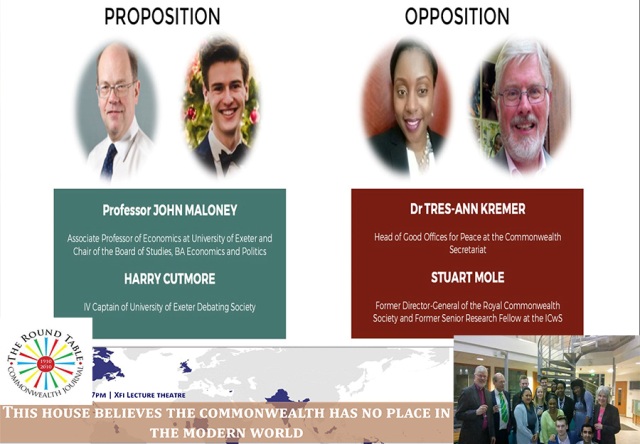
“It serves little useful purpose….it is ineffective on human rights…and any thought of it becoming a trading bloc is sheer fantasy. It is merely the ghost of the British Empire”.
This was John Maloney’s damning verdict on the modern Commonwealth. The former Treasury official and now Associate Professor of Economics at the University of Exeter was proposing the motion: “This House believes the Commonwealth has no place in the modern world”. The debate took place on the evening of Friday 26 January, under the auspices of the University of Exeter’s Debating Society.
Vigorously rebutting these charges, and opposing the motion, was Dr Tres-Ann Kremer, from Jamaica, Head of Good Offices for Peace at the Commonwealth Secretariat. Tres-Ann, who is a certified mediator and conflict resolution trainer and who previously gained extensive experience with Amnesty International’s Crisis and Conflict Management Unit, spoke of some of the current governance challenges in the Commonwealth in which she had been involved, including Lesotho, Zambia and The Gambia (now set to return to Commonwealth membership). A particular priority was tackling violence against women and girls, not least child, early and forced marriage. Through the authority of the Commonwealth Kigali Declaration, the Secretariat was working to prevent and eradicate these practices within the Commonwealth. In emphasising the importance of empowering young people, she said that the Commonwealth was a significant global agency for peace and reconciliation.
Seconding the motion was Harry Cutmore, IV Captain of Debates and an Exeter Undergraduate studying English literature. He denounced the Commonwealth for ‘legitimising British colonial rule’ and argued that old attitudes and misconceptions – some stretching back to mid-Victorian times – would be perpetuated as long as the organisation existed. He also cited the reports of the Commonwealth Human Rights Initiative which repeatedly highlighted shortcomings in the organisation.
Stuart Mole, former Chair of The Round Table and one-time Director-General of the Royal Commonwealth Society, accepted that the Commonwealth was not perfect but then no country, or international organisation, was; and, taken as a whole, Commonwealth countries scored better in democracy and human rights indices than many comparable bodies. Certainly, the Commonwealth had been a trailblazer in requiring its membership to live up to its standards and values (now enshrined in the Commonwealth Charter).
The debate was enlivened by the presence of a number of Commonwealth Scholars, some studying at Exeter but others from as far afield as Bristol and Brighton. Dr Rizwan Javed, from India, who is specialising in post-doctoral training in transfusion and transplantation medicine, spoke warmly of his experience of the Commonwealth and pointed out that he and his colleagues would not be benefiting from education exchange and development, were it not for the Commonwealth.
The debate ranged over many aspects of the Commonwealth connection, including sport, the free movement of people, military co-operation and Brexit.
After calling for concluding speeches, Dane Harrison, presiding, took a vote of the eighty or so students and visitors present, and the motion was roundly defeated. Whatever their views, all were then welcomed to a wine reception afterwards, sponsored by The Round Table: the Commonwealth Journal of International Affairs.
The Exeter debate was part of a series of UK-wide Commonwealth debates organised by The Round Table in advance of the Commonwealth Summit, to be held in London in April.
Related articles:
Students and academics in Birmingham 17 January debate on the Commonwealth
Lord Howell on The Commonwealth as the “mother of all networks”



